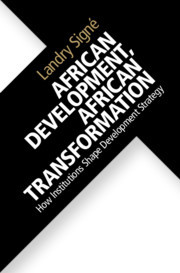Description
African Development, African Transformation
How Institutions Shape Development Strategy
Author: Signé Landry
A deep insight into the emergence and persistence of new continental development institutions in Africa and their capacity to affect development outcomes.
Language: English
Subject for African Development, African Transformation:
Approximative price 32.87 €
In Print (Delivery period: 14 days).
Add to cart
African Development, African Transformation
Publication date: 11-2018
220 p. · 15.2x22.7 cm · Paperback
Publication date: 11-2018
220 p. · 15.2x22.7 cm · Paperback
Approximative price 99.06 €
In Print (Delivery period: 14 days).
Add to cart
African Development, African Transformation
Publication date: 11-2018
220 p. · 15.7x23.5 cm · Hardback
Publication date: 11-2018
220 p. · 15.7x23.5 cm · Hardback
Description
/li>Contents
/li>Biography
/li>
Africa is home to many of the world's fastest-growing economies. This powerful book traces new continental institutions for development and their capacity to affect economic growth, regional integration, and international cooperation in Africa. It also assesses Africa's ability to achieve the Sustainable Development Goals and the African Union's Agenda 2063. As the continent's most ambitious development initiative since independence, the African Union Development Agency (or AUDA, previously known as the New Partnership for Africa's Development or NEPAD) provides an excellent case study for examining how an African-based, continent-wide development institution emerged. Inspired by the ideas of Pan-Africanism and the African renaissance, NEPAD was created to bring Africa into the globalizing world, to close the gap between developing and developed countries, to enhance economic growth, and to eradicate poverty. Almost two decades after NEPAD's creation and given its transformation into AUDA, this brilliant book examines AUDA's role in achieving these goals.
Introduction: the African Union Development Agency and Africa's transformation in the twenty-first century: innovation or continuity?; 1. An analytical framework to explain the origin, development, and effects of AUDA; 2. The foundations and first generations of structural adjustment programs; 3. Partial reorientation of the International Monetary Fund and World Bank discourse and the creation of AUDA; 4. AUDA and international financial institutions: change or continuity?; 5. AUDA in the twenty-first century: evolution, implementation of key programs, institutional development, and inter-state coperation; 6. Financing Africa's development in the twenty-first century: assessment and perspectives of AUDA's resource mobilization strategy; 7. The way forward to transforming Africa by 2030/2063: resource mobilization, financing, and capacity-building strategies for effective delivery of the sustainable development goals and the African Union Agenda 2063; Conclusion: continental development fifteen years after the creation of AUDA: theoretical and practical implications.
Landry Signé is a David M. Rubenstein Fellow at the Global Economy and Development and Africa Growth Initiative at the Brookings Institution, Distinguished Fellow at Stanford University's Center for African Studies, Andrew Carnegie Fellow, Chairman of the Global Network for Africa's Prosperity, Professor and Senior Adviser to the Chancellor at UAA, Special Adviser to Global Leaders, and was a Woodrow Wilson Center Public Policy Fellow, and Visiting Scholar at the University of Oxford. He is the author of numerous key publications in the political economy of development with a focus on Africa and has a special interest in the politics of economic reform, regional integration, institutional change, business in emerging and frontier markets, global political economy, governance, state capacity and fragility, political regimes, public service delivery and the fourth industrial revolution. He is the recipient of more than sixty awards and recognitions from four continents. He has been recognized as a World Economic Forum Young Global Leader for 'finding innovative solutions to some of the world's most pressing issues', as an Archbishop Desmond Tutu Fellow who 'drives the transformation of Africa,' and was named one of the 'Top 10 Outstanding Young Persons in the World.' He has authored numerous key publications, including Innovating Development Strategies in Africa (Cambridge, 2017). His work has appeared in The New York Times, The Washington Post, Foreign Affairs, and Harvard International Review.
© 2024 LAVOISIER S.A.S.




